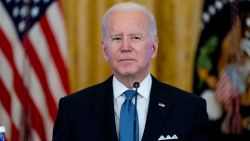Worries over soaring prices and the Omicron variant of the coronavirus soured Americans’ views of the economy in January.
US consumer sentiment in January fell nearly 5% to the lowest level since November 2011, the University of Michigan’s consumer sentiment survey showed Friday.
Survey respondents felt worse about both the current economic conditions, as well as the outlook for the near-term.
Consumer sentiment has been on a roller coaster throughout the pandemic, initially plummeting in the spring of 2020, then recovering in lockstep with the reopening, before it again declined amid the spread of the Delta variant that weighed on the economy in the summer.
With a new variant — Omicron — in town, it’s not surprising that consumers are again feeling anxious.
The sentiment peaks of 2021 are unwinding in an erratic way, as the boost from stimulus dollars, vaccines and a slow return to “normal” is waning in the face of high Covid infections, said Mike Englund, chief economist at Action Economics.
But there are additional factors at play, too: inflation is rampant, and Americans are worried their wage gains are eroded by rising prices.
“Consumers may misinterpret the [Federal Reserve]’s policy moves to slow the economy as part of the problem rather than part of the solution,” said Richard Curtin, chief economist at the Surveys of Consumers.
The Fed announced an end to its pandemic-era stimulus program late last year and signaled a first interest rate increase for March earlier this week.
“The danger is that consumers may overreact to these tiny nudges, especially given the uncertainties about the coronavirus and other heightened geopolitical risks,” said Curtin.
Amid all this, confidence in government economic policies is at its lowest level since 2014, with geopolitical risks including the Russia-Ukraine situation not helping matters.























